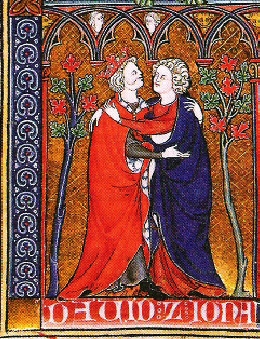11 July. Saul becomes jealous of David
“When David came back from killing Goliath, Abner [Saul’s army commander] brought him to Saul. David was still holding Goliath’s head. Saul asked him, ‘Young man, who is your father? David answered, ‘I am the son of your servant Jesse of Bethlehem’”
“When David finished talking with Saul, Jonathan felt very close to David. He loved David as much as he loved himself. Saul kept David with him from that day on and did not let him go home to his father’s house.”
“Jonathan made an agreement with David, because he loved David as much as himself. He took off his coat and gave it to David, along with his armour, including his sword, bow and belt.”
“Saul sent David to fight in different battles, and David was very successful. Then Saul put David over the soldiers, which pleased Saul’s officers and all the other people.”
“After David had killed the Philistine, he and the men returned home. Women came out from all the towns of Israel to meet King Saul. They sang songs of joy, danced, and played tambourines and stringed instruments. As they played, they sang,
‘Saul has killed thousands of his enemies,
But David has killed tens of thousands.’
“The women’s song upset Saul, and he became very angry. He thought, ‘The women say David has killed tens of thousands, but they say I have killed only thousands. The only thing left for him to have is the kingdom!’ So Saul watched David closely from then on, because he was jealous.”
“The next day an evil spirit from God rushed upon Saul, and he prophesied in his house. David was playing the harp as he usually did, but Saul had a spear in his hand. He threw the spear, thinking, ‘I’ll pin David to the wall.’ But David escaped from him twice.”
“The LORD was with David but had left Saul. So Saul was afraid of David. He sent David away and made him commander of 1,000 soldiers. So David led them in battle. He had great success in everything he did because the LORD was with him.”
“When Saul saw that David was very successful, he feared David even more. But all the people of Israel and Judah loved David because he led them well in battle.”
(1Samuel 17:57-58 & 18:1-16)

Have you noticed that there are two alternative accounts in today’s passage of what happened to David immediately after the death of Goliath?
In the first account (in 1 Samuel 17:57 – 18:5), David is brought before Saul by his army commander, and Saul asks who David is. David (who, according to this account has just come from tending his father’s sheep near Bethlehem –see 1 Samuel 17:12-40) is then sent to fight in the army and is subsequently promoted.
In the second account (in 1 Samuel 18:6-16), David returns to Gibeah with the triumphant Israelite army. Saul (and the local people) already know who he is, and the women sing his praises. Saul is jealous of David (who, according to this account, is his regular harp player) and throws a spear at David, intending to kill him.
Why are there two separate (and somewhat different) accounts of the story of David and Goliath? The answer lies in the origin of the Hebrew Bible, which was compiled in its present form from two different accounts – one originating in the northern kingdom of Israel, and the other coming from the southern kingdom of Judah. These two separate accounts were combined into one narrative to form the current Hebrew Bible (and the Christian ‘Old Testament’) after the return of the Jews from exile during the 6th century BC.
This also explains why the Old Testament is so ‘long-winded’ as it often repeats everything twice in slightly different words, often in neighbouring verses. If you haven’t spotted this already, keep a look out for frequent repetition as we read on!
The other fascinating feature of today’s passage is the very close friendship between David and Saul’s son Jonathan. There are several ways of interpreting this.
Many Biblical commentaries look upon this relationship as a close friendship between two young boys. But this explanation is unsatisfactory, as it’s quite clear from the context that neither David nor Jonathan were ‘boys’. Saul calls David a “young man” (1 Samuel 17:58), and we’re told that both David and Jonathan were old enough to fight in Saul’s army. Jonathan gave David “his armour” and “his sword, bow and belt” (1 Samuel 18:4), while, in the next verse, “Saul sent David to fight in different battles” (1 Samuel 18:5). Shortly afterwards, David was made a commander over 1,000 soldiers (1 Samuel 18:13).
More recent commentators have suggested that David and Jonathan were engaged in a passionate homosexual relationship as we’re told (twice) that Jonathan “loved David as much as himself” (1 Samuel 18:1&3). This, however, is equally unlikely, given the strict Old Testament moral code forbidding homosexual relationships (see Leviticus 18:22).
Much more likely is that Jonathan had a teenage ‘crush’ on the hero of the hour, David. While the Bible does not tell us Jonathan’s age, as Saul was probably in his mid-to-late 30s, it’s likely that Jonathan was a teenager. David, on the other hand, was probably a few years older, in his early 20s. As any young school teacher will recognise, this sounds like a typical teenager’s admiration of someone they ‘love’ who is just a few years older than themselves – a successful role model of the same gender whom they look up to passionately and aspire to imitate. Fortunately for David, this teenage loyalty from Saul’s son was soon to save his life.
The photo shows David and Jonathan in a 14th century manuscript illustration (in the British Library).
You can read more about the compilation of the Hebrew Bible (and the Christian ‘Old Testament’) @ https://www.thebiblejourney.org/biblejourney2/22-the-world-of-the-old-testament-journeys/who-wrote-the-old-testament/
